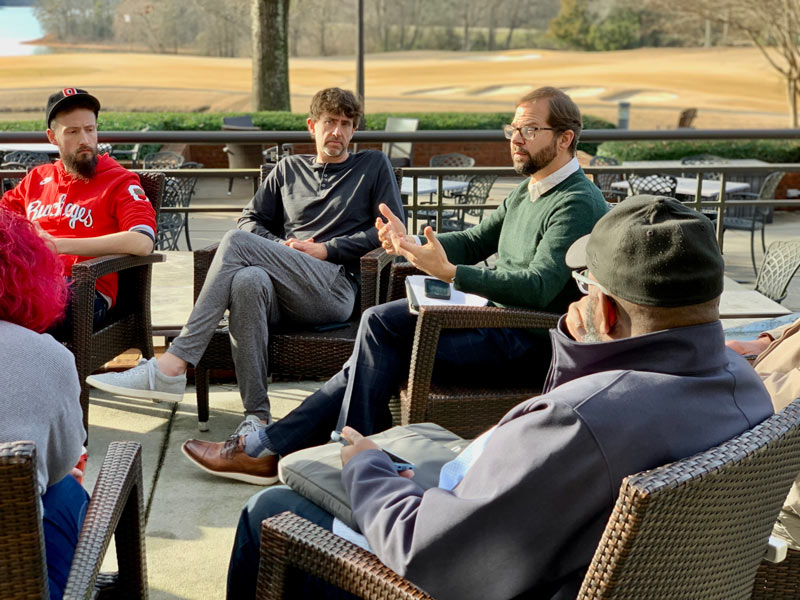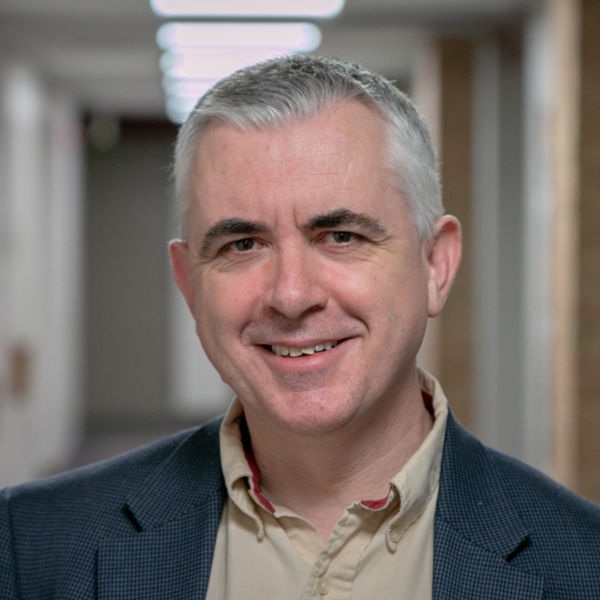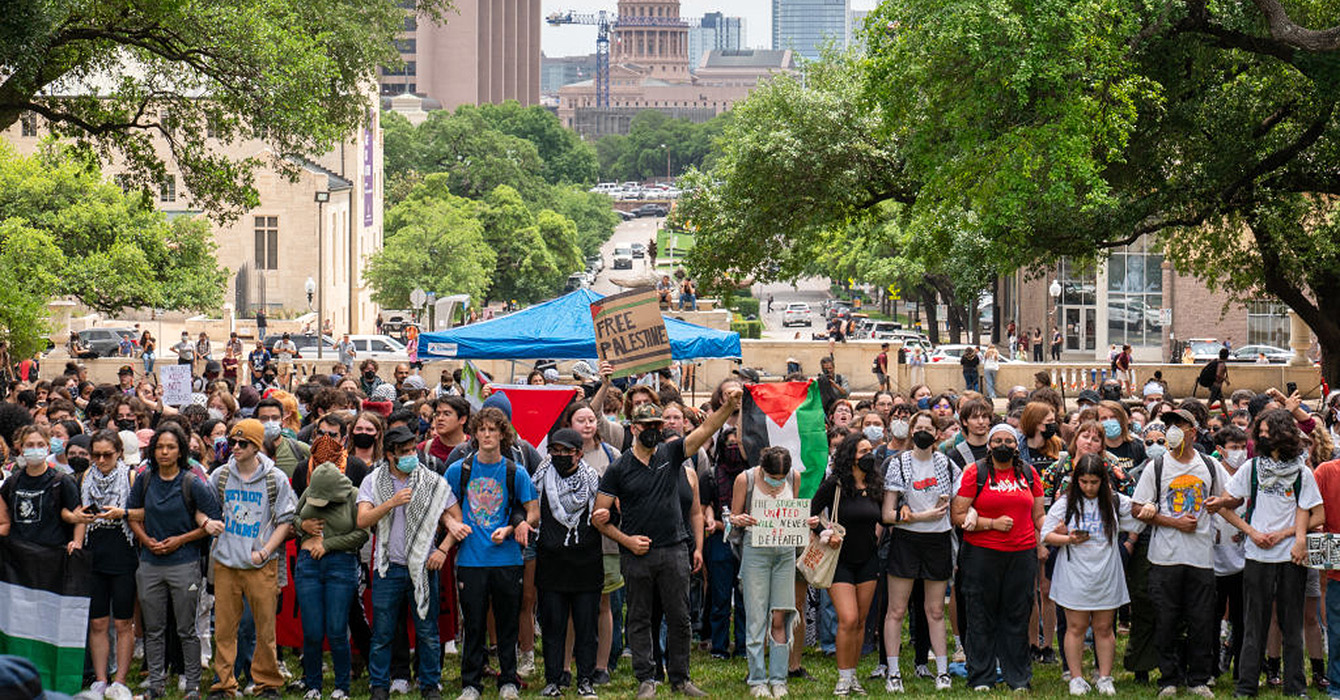The Rev. Laura Edgar said she’s long had the intention of holding conversations with her church’s neighbors at nearby Auburn University. But only recently has she learned the language and skills to do that, said Edgar, the associate pastor for youth, college and young adults at Auburn First Baptist Church.
The key, she said, is “to learn what the needs truly are, and not what we think the needs are.”
Edgar’s congregation is one of 16 to take part in The Vinery: Awakening Faith and Flourishing at the Intersection of Church and University. The program invites congregations close to college campuses that are ready and willing to build or expand relationships with their campus communities into a two-year process of congregational reflection, listening and discernment.
There are about 20 million college students across the United States, and about 5,000 churches located within 2 miles of a campus. We believe that in bringing these two communities together, the torn fabric of American life can begin to be rewoven by forming healthy human beings serving the common good in the likeness of Christ.
In 2021, the college ministry Mere Christianity Forum launched The Vinery to build connections between churches and universities with a grant from Lilly Endowment Inc.’s Thriving Congregations Initiative.
The Vinery does not focus primarily on college ministry programming or increasing attendance numbers of young people in Sunday worship. We do hope that these are manifestations of the inner work of the congregations. But before that work can begin, we invite congregations to practice deep listening.
Why deep listening? Deep listening, in simple terms, is intentionally hearing the needs and interests of others and taking them seriously. It involves listening to what is said and what is not said.
At our 2023 annual Vinery gathering, the Rev. Judy Peterson offered some guidelines. Deep listening is more than being present, having good body language and hearing what others are saying, she said. It entails exhibiting a generosity that invites speakers to talk to us from their hearts — and does not send them signals that we only have time for a summary.
We begin by asking participants to explore how they are listening to God, themselves, their congregations and their campuses. Then we ask how listening more intentionally might help them become better neighbors to the young adults, staff, administrators, faculty and alumni near them. Through their listening process, congregations can learn of needs they hadn’t anticipated or sense a call to people they hadn’t noticed.
As our first group of congregations finishes its first year, this emphasis on deep listening has made a remarkable difference.
The Rev. Bromleigh McCleneghan of United Church of Gainesville in Gainesville, Florida, said that people have started showing up in her office to talk over concerns about issues on campus and their sense of inadequacy in the face of overwhelming student need.
“Slowly, through deep listening, a nascent vision of what ministry alongside our university neighbors could be is beginning to emerge,” McCleneghan said.
Deep listening entails building relationships and allowing our learnings to guide strategic and ministry plans, rather than showing up with agendas preset by boards and councils.
Granted, it’s easier to plan a pizza party at the church than to commit to regularly eating in the student dining hall. It takes less effort to build a ministry program from a list of suggestions than to take time to learn what people really want.
But when congregations really listen to their collegiate neighbors, they can serve them better. One Vinery congregation heard from students that buying textbooks was a financial burden; the church created a fund to help them. In another congregation, young adults are finding companionship with a small group of octogenarians who drink tea and knit on Friday afternoons.
Deep listening doesn’t stop at listening, though; it merely starts there. The next step after hearing people’s needs is making an effort to meet those needs.
McCleneghan in Gainesville said the conversations she’s had have inspired her to take that next step.
“It’s not what I anticipated, but it certainly feels important. Deep listening is allowing me and the other lead team members to hear God calling us to some new thing,” she said.
McCleneghan said she has scheduled a meeting to talk with the folks showing up in her office and sending her texts — an event that will be “just the next stage of this unfolding conversation.”
Peterson, in her address to the annual Vinery gathering, said that a deep listening practice isn’t just for specific occasions or meetings; how we listen — or fail to listen — in the everyday, mundane moments of our lives creates our listening habits.
The Rev. Elexis Wilson, the pastor at Wayman African Methodist Episcopal Church in Bloomington, Illinois, said at the gathering that we have to discipline ourselves not to mentally multitask by thinking about what’s next or how we might fix the problem at hand: “Many times, the task is to just listen.”
For Wilson, whose father was a pastor, this practice has particular meaning.
“I do not think I am ever listened to without [listeners] looking for the end game,” she said. “As a preacher’s kid, I felt like there was no genuine want to know my thoughts unless they wanted something from my father or were being paid. Nobody naturally would sit and hear me.”
Deep listening is vital to The Vinery’s process. It requires that we be intentional about prioritizing listening, even when it’s inconvenient.
Can we teach ourselves not to answer the phone when we’re distracted? Can we avoid thinking about laundry or clicking on Facebook during Zoom meetings? Can we learn to say, “I’d like to hear what you’re saying, but now is not a good time — could we schedule a conversation later, when we both can focus?”
How do we listen, not only to our congregations, campuses and constituencies, but also to our co-laborers? How might our deep listening make us better disciples, colleagues, leaders and friends?
Yes, it feels terribly inefficient. Yet I know that for my life as a disciple — as well as for congregations — it’s crucial. May we help people know that they are cared for and listened to — by us and by God.
Deep listening doesn’t stop at listening, though; it merely starts there. The next step after hearing people’s needs is making an effort to meet those needs.


















